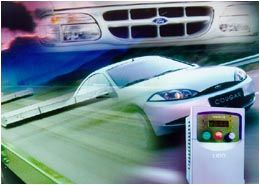|
Driving up production
 A
company supplying cooling and air conditioning systems to Ford Motor
Company is undergoing a manufacturing process overhaul, with a view
to enhancing production efficiency and improving supply scheduling. A
company supplying cooling and air conditioning systems to Ford Motor
Company is undergoing a manufacturing process overhaul, with a view
to enhancing production efficiency and improving supply scheduling.
Ford, with it's new range of cars, aims to please not only aesthetically
and on the road, but it also has ambitions to make them the best
logistical choice for owners in the UK and, indeed, world-wide.
By ensuring the best possible availability from its assembly lines
and offering a comprehensive parts replacement service within tight
time schedules, Ford hopes to make its latest vehicles the easiest
to buy and run.
The process is beginning at grass roots level, with supply companies
being asked to provide just-in-time delivery of components to both
assembly plants and parts distributors in order to meet demand as
it arises. Visteon, a key supplier to the Ford Motor Company, has
taken this forward at its Basildon plant with the creation of the
Vision 98 project, which aims to optimise supply scheduling by maximising
automation as far as possible.
The first stage of the project has been the installation of a fully
automated conveyor system by BA Ridgwell Limited, a specialist in
the design and manufacture of integrated conveyor and automation
systems.
The function of the conveyor system is to deliver radiators of varying
sizes from two heat curing ovens at carefully controlled speeds
to operatives at a single line who sort them, add the tanks, label
and leak test them, ready for dispatch.
Reliability is key because the line is in operation 24 hours a day,
7 days a week, as is total speed control to allow the assembly operatives
to complete their tasks with minimal duress, and hence error, while
maintaining throughput on schedule. Flexibility to meet possible
line changes in future as the Vision 98 project moves to further
stages is also a consideration.
To achieve the desired effect, BA Ridgwell Limited constructed a
series of 27 individual belt conveyors, combining dual lines exiting
the curing ovens into one and then making three 90 degree turns
over the course of the 162 metre line, finishing with a single line
of conveyors at the assembly point.
A 550-Watt motor, turning over at relatively low speeds, powers
each conveyor and a separate HID Hitachi three phase 400-Watt L100
AC inverter, housed in a central panel with the PLC, controls the
speed of each motor. With relatively few changes in speed, PC control
is not required, so centralised potentiometers set the speed of
groups of conveyors to suit throughput requirements.
Infrared detectors mounted at the end of each conveyor trip a stop
signal when too many radiators are queuing up and an alarm system
allows any of the assembly operatives to halt the line.
Dave Eldret, technical sales engineer for BA Ridgwell Limited, explained
why they specified the HID inverters: " We introduced HID into this
plant because their inverter is compact and easy for the operative
to understand and use. HID has, in fact, become something of a standard
with our conveyor systems."
The Hitachi L100 drive is available in single phase from 0.2kW to
2.2kW in the 200V class and in three-phase from 0.4kW to 7.5kW in
the 400V class. It incorporates PID control and RS422 communications
and has seven inputs, of which five are programmable, plus two programmable
outputs and an alarm output.
Speed setting is by a simple potentiometer on the front panel or
by external analogue or digital signals. A standard on-board keypad
and LED is used for programming. The L100 is protected by alarms
for over-current, over-voltage under-voltage, over-temperature,
overload, ground fault, etc. Acceleration and deceleration ramps
can be set between 0.1 and 990 seconds.
The L100 carries UL and CSA approvals, as well as CE certification
for low voltage and EMC Directives.
Return
to L100 Case Studies Menu
|

